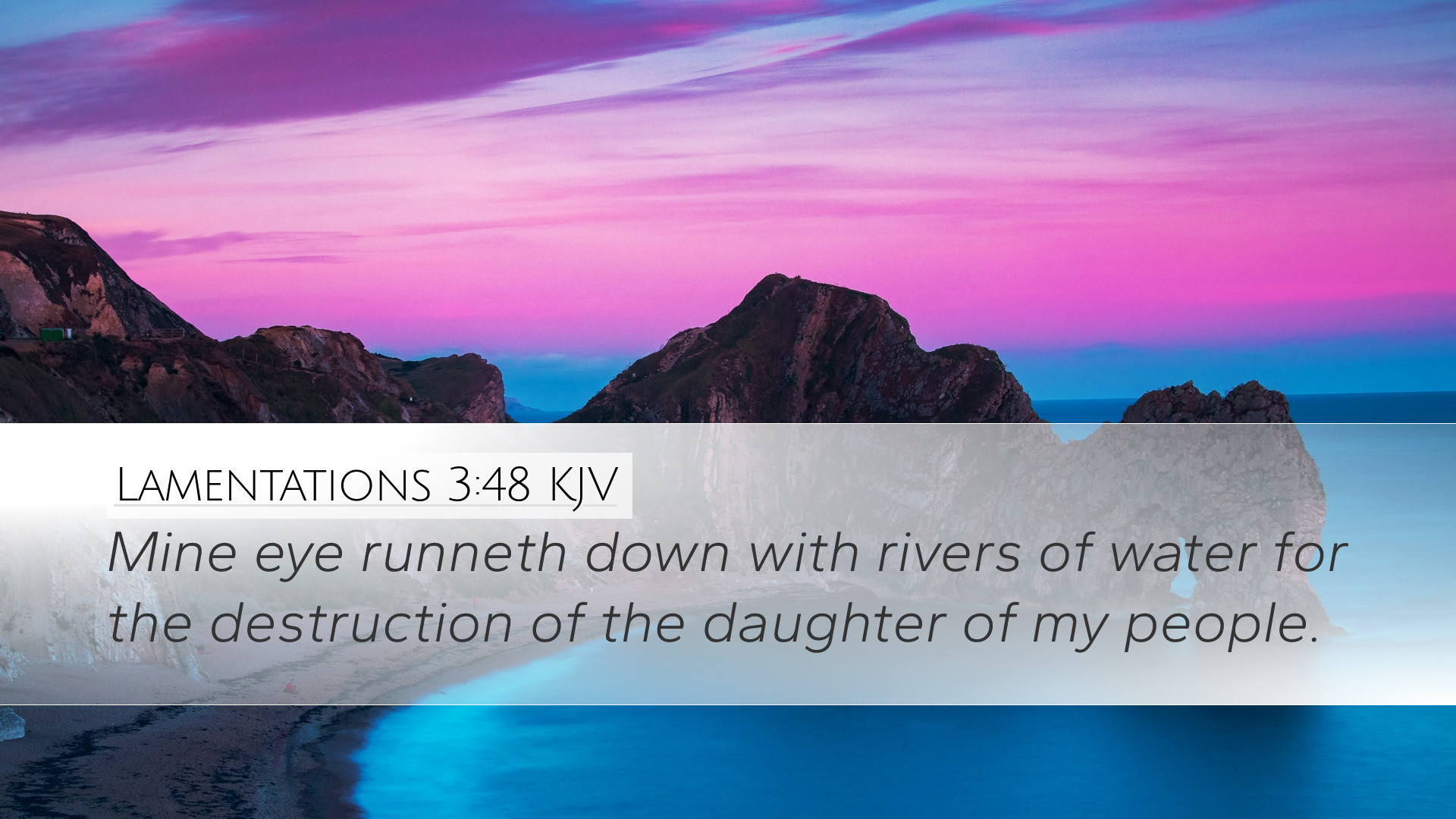Lamentations 3:48 - A Commentary
Verse: "Mine eye runneth down with rivers of water for the destruction of the daughter of my people."
Introduction
The book of Lamentations is a poignant reflection on the destruction of Jerusalem and the deep sorrow of the people of Israel in the wake of this tragedy. Chapter 3, positioned at the heart of this book, encapsulates the despair and suffering experienced during this tumultuous period. In Lamentations 3:48, the prophet expresses profound grief over the devastation faced by his people. This commentary draws insights from esteemed public domain sources, enhancing our understanding of this evocative verse.
1. The Grief Expressed
Matthew Henry notes that the metaphor of “rivers of water” aptly conveys the depths of mourning that overwhelms the prophet. He emphasizes that the tears symbolize not just personal sorrow but a collective anguish experienced by the entire community.
- Emotional Depth: The tears are indicative of a broader suffering, showcasing the emotional burden borne by the prophet as he intercedes on behalf of his people.
- Symbolism of Water: Water often symbolizes life; hence, the rivers of tears point to the lifelessness that follows destruction.
2. The Cause of Mourning
Albert Barnes provides additional context regarding the reasons for such deep mourning. He suggests that the lamentation springs from the awareness of sin and its consequences, which have led to the dire state of the nation.
- Recognition of Sin: The prophet acknowledges that Israel's transgressions have resulted in their suffering, as they have turned away from God.
- National Destruction: This sorrow is deeply tied to the destruction not just of the city, but of a way of life, culture, and the covenant relationship with God.
3. Theological Implications
Adam Clarke explores the theological ramifications of this mourning. He articulates how such grief opens a dialogue about the justice of God in relation to human suffering.
- God's Displeasure: The tears may also reflect a recognition that the destruction is a form of divine judgment, stirring theological inquiry into God's nature.
- Hope Amidst Sorrow: Clarke suggests that while the lament is significant, it does not preclude the glimmers of hope that run through the text, allowing for reflection on God's mercy even amid despair.
4. Application for Today
This verse has profound implications for modern readers, particularly pastors, students, and scholars who seek to understand the nature of human sorrow in light of divine sovereignty.
- Empathy in Ministry: Pastors can take from this example a model for approaching ministry during times of collective grief, encouraging an empathetic response to the suffering of others.
- Reflection on Collective Sin: Students and theologians can contemplate the importance of recognizing societal sins that lead to communal suffering, advocating for repentance and restoration.
- Hopeful Lamentation: The structure of this lament serves as a reminder that even in sorrow, there can be hope for restoration, urging believers to bring their grief before God.
5. Conclusion
Lamentations 3:48 serves as both a cry of despair and a contemplative reflection on the nature of grief, sin, and divine justice. By examining the insights from Matthew Henry, Albert Barnes, and Adam Clarke, we glean a richer understanding of the complexities of human emotion in relation to God. This verse invites readers into a deeper engagement with their own struggles and laments while fostering a perspective that recognizes both the gravity of sin and the profound mercy of God.


